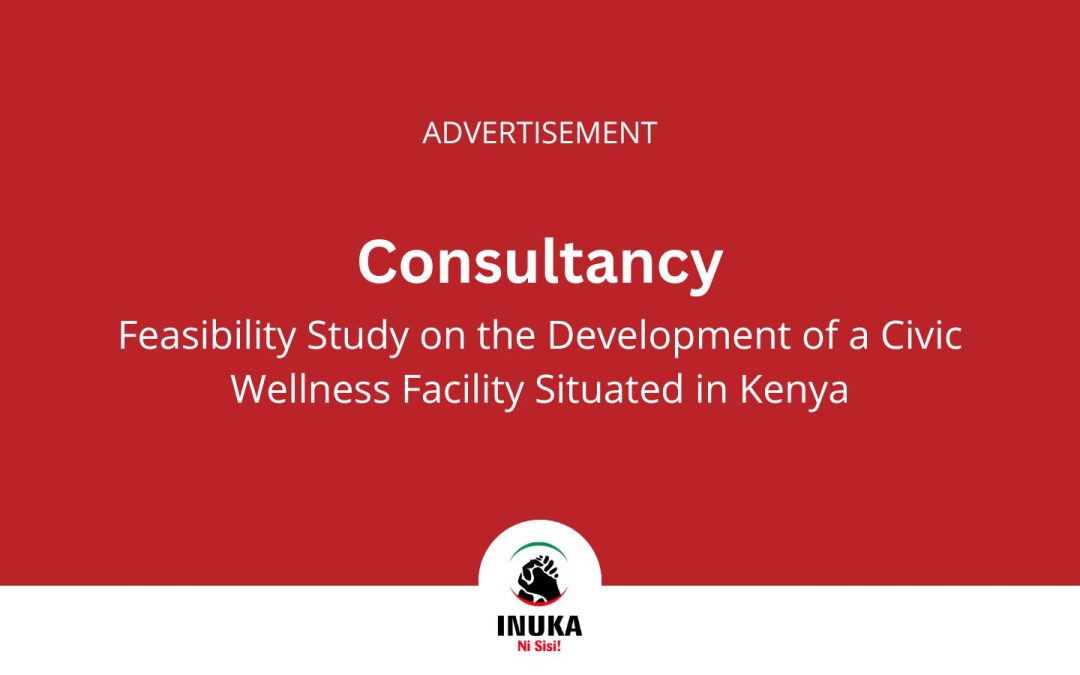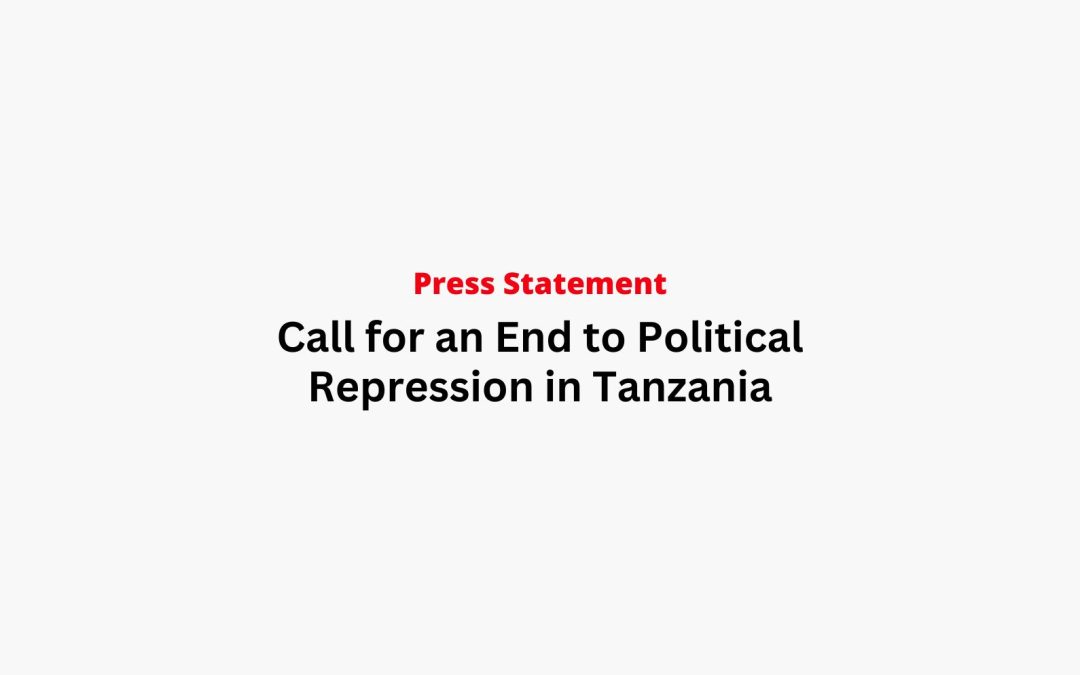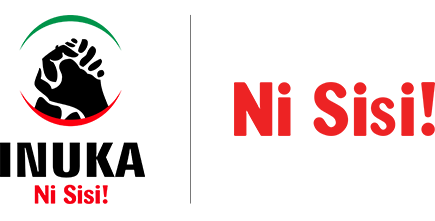
by Inuka Kenya | May 28, 2025 | Opportunities
About Inuka Kenya Ni Sisi:
Inuka Kenya Ni Sisi! is a Kenyan grassroots social movement organization founded in 2009 and registered/incorporated as a Company Limited by Guarantee in 2012. It envisions a peaceful, united and well-governed Kenya with equal economic and social opportunity for all citizens. The organization exists to empower Kenyan citizens to improve their lives and demand good governance as a means to achieve socio-economic growth and equality of opportunity among all Kenyans. It aims to curate a social movement (the Ni Sisi! Movement) that will seek to unite Kenyans to forge a collective identity, drive transformation in leadership and improve maisha — wellbeing — for all Kenyans. To this end, Inuka supports community groups/organizations and collaborates with initiatives at the local, national and regional level to build capacity and linkages for effective collective action. Inuka Kenya Ni Sisi!’s philosophy is underpinned by the concept of “dignity before development” — each individual’s inherent dignity must be upheld at all levels of interaction.
Inuka Kenya has developed three strategic objectives which, together, will form the basis upon which citizens at the local level will find their efforts to take charge of their citizenship and governance processes. As such, the three objectives are the key pillars that will support the creation of a Ni Sisi! Social movement.
These three objectives are:
- Transformative Leadership and Governance Pillar: Strategic Objective 1: To create and curate narratives that seek to transform leadership and governance to be in accord with Utu.
- Individual Agency, Dignity and Livelihoods Pillar: Strategic Objective II: To harness a collective positive and resilient identity in order to build, protect, restore and ensure human dignity for all.
- Movement Building Pillar: Strategic Objective III: To build a social movement of active citizens who take charge of governance at all levels.
About the Project
Inuka Kenya Ni Sisi! Ltd is implementing the Wellness Hub Program—an initiative designed to provide civic actors with safe and supportive spaces to heal, reflect, learn, and grow. Recognising the increasing threats and pressures faced by civic actors, including physical, emotional, mental, and spiritual strain, Inuka aims to establish a dedicated wellness facility. To support this, the organisation seeks to engage a qualified consultant or consultancy firm to assess the viability of identified land parcels for this purpose.
Objectives of the Assignment
The overall objective is to conduct a baseline assessment and due diligence on three proposed land parcels in Narok (10 acres at Esupetei), Nanyuki- Mutirithia (10 acres on Naibor-Endana Rd) and Ndauni (20 acres on Kitui/Kibwezi Rd, next to Ndauni shopping centre) to determine their suitability for establishing a wellness facility. The specific objectives are to:
- Conduct due diligence checks on the legal, environmental, and physical attributes of each parcel of land.
- Assess suitability based on:
- a) Alignment with Inuka’s core wellness mandate for civic catalysts.
- b) Long-term sustainability, including viable business and operational models. c) Cost-effectiveness in acquisition, development and usability considering a limited budget.
- Develop a comprehensive facility development proposal that includes concept design, phased implementation, and sustainability planning.
Deliverables/Expected Outputs
The consultant will work closely with Inuka staff to refine the proposed scope of work prior to commencement of the assignment. The key deliverables aligned with the objectives of the due diligence on the viability of land for a wellness facility are as follows:
Key Deliverables
- Preliminary Assessment Report
Summary of initial observations on the suitability of land in Narok, Nanyuki, and Ndauni, including land use, accessibility, environmental factors, and community context.
- Wellness Landscape Brief
A contextual overview of the state of wellness among civic actors in Kenya, Tanzania, and Uganda to inform the facility’s design and relevance.
- Due Diligence Report
Verify land ownership and title status, assess zoning, land use restrictions, and permitting requirements, conduct environmental screening, e.g., flood risk, contamination, biodiversity, and review infrastructure availability.
- Development Concept Proposal
A detailed proposal outlining the facility’s concept design, phased implementation plan, budget estimates, and sustainability strategy, including partnerships and revenue options.
Work Plan and Time Schedule
The assignment will commence on Aug 18, 2025 and be completed and a final report submitted by September 30, 2025
Consultant’s Profile
The ideal consultant/firm should demonstrate a multidisciplinary background and the ability to provide a technically sound and contextually relevant assessment.
Minimum Qualifications and Experience:
A relevant degree in Land Economics, Urban and Regional Planning, Environmental Studies, Real Estate, Development Studies, Public Health, Project Management or related fields from a recognised university.
Technical Competencies:
- At least five (5) years of professional experience conducting feasibility studies, land due diligence, or baseline assessments, particularly within Kenya or East Africa. 2. Demonstrated expertise in land use assessment, property valuation, environmental impact analysis, or spatial planning.
- Proven experience in conducting multi-site assessments with a capacity to evaluate geographic, socio-economic, and infrastructural factors.
- Understanding of wellness programming and facility development, particularly models that integrate economic and psychosocial sustainability.
- Knowledge of business modelling and assessing long-term sustainability strategies for development projects.
- Sound understanding of legal and policy frameworks governing land acquisition, ownership, zoning, and development in Kenya.
- Demonstrated capacity to analyse, synthesise, and present data clearly in written and visual formats.
Budget and Logistics
The consultant shall submit the proposed budget with broken-down costs for particular items, for the assignment, including breakdown and justification. Prices quoted should be inclusive of all taxes and delivery costs to the required site (where applicable) and must be in Kenya Shillings and shall remain valid for one hundred and twenty (120) days from the closing date of the tender.
Submission of Proposals / EOI
Based on the above, Inuka is inviting interested parties to submit expressions of interest. Individuals or firms applying shall detail the following:
- Consultants’ profile and capability statement describing the technical capacity and experience of the firm or group of individuals.
- Names and resumes of individual(s) or team members proposed and their roles in the achievement of the assignment.
- Testimonials and sample reports of similar assignments taken in the recent past. 4. Technical Proposal interpretation of the Terms of Reference (TORs).
- A financial proposal clearly demonstrating the costs of the consultancy.
- Detailed implementation plan and time frames.
Inuka reserves the right to accept or reject any tender and may annul the tendering process and reject all tenders at any time prior to contract award without thereby incurring any liability to the affected tenderer or tenderers.
The proposal shall be sent, in soft copy, to the following email: procurement@inukakenya.com
The deadline for submission is July 28th, 2025. Only shortlisted candidates will be contacted.

by Inuka Kenya | May 21, 2025 | Press Statements, Stories
Nairobi, Kenya – May 20, 2025
In light of recent developments in Tanzania—including rising civic unrest, a shrinking of the democratic space, and growing citizen demands for accountability—Inuka Kenya Ni Sisi!, alongside other human rights organizations, expresses deep concern over what appears to be an escalating crackdown on opposition voices ahead of the upcoming general elections in October 2025. The arrest of opposition leaders, coupled with reports of abductions and targeted violence against government critics, has drawn widespread condemnation and raises serious questions about the country’s commitment to democratic principles and the rule of law.
Tundu Lissu, a prominent Tanzanian opposition leader, human rights lawyer, and former Member of Parliament, is widely recognized for his outspoken criticism of government corruption and authoritarianism. In September 2017, Lissu survived an assassination attempt, was exiled and on his return in 2022 he was placed under house arrest when he cited irregularities in the elections. In early 2023, he returned again to Tanzania in what was seen as a test of President Samia Suluhu’s openness to political pluralism. In May 2025, Lissu was charged with treason, prompting outrage from civil society and leading to regional solidarity from Kenyan and Ugandan activists. His court hearing drew attention due to the Tanzanian government’s reaction, including the arrest and deportation of human rights defenders from the region who had gone to observe the court process in solidarity.
The shrinking of civic space and hostility toward human rights defenders—must be understood against a backdrop of Tanzania’s post-independence political legacy, gradual liberalization, and recent resurgence of authoritarianism. Tanzania’s political journey begun with strong one-party rule under President Julius Nyerere, who promoted unity, socialism (Ujamaa), and self-reliance. During this time, opposition was not allowed, and civil society had little freedom. In the 1990s, Tanzania introduced multi-party democracy, allowing opposition parties, independent media, and civil society groups to emerge.
However, the ruling party, CCM, kept a firm hold on power. Under President Magufuli (2015–2021), civic space shrank sharply. Opposition rallies were banned, media was silenced, and civil society was closely monitored. New laws were used to control information and suppress dissent. When President Samia Suluhu Hassan took office in 2021, many hoped for change. She reopened some media and freed political prisoners, but deeper reforms have not happened. President Samia’s recent criticism of regional solidarity efforts shows a growing resistance to external scrutiny and signals a return to one party dictatorship. The silence from the governments of Kenya and Uganda reeks of complicity of both Presidents Yoweri Museveni and William Ruto in the actions of Suluhu. The arrest and deportation of regional civic actors’ signals hostility toward collaboration and solidarity among East African peoples.
Tanzania’s actions undermine the spirit of the East African Community (EAC) and African Union (AU) charters, which commit member states to uphold democracy, human rights, and free movement of people. If left unchecked, this will erode the legitimacy and accountability of these regional frameworks.
We will not remain silent.
We call upon:
- Citizens, youth, and grassroots movements across the continent to stay vigilant, organized, and courageous in defending people-centered leadership and inclusive governance. The youth in Tanzania must especially rise to the occasion of securing a democratic future for their country.
- Civil society across East Africa to raise their collective voice, document civic repression, and stand in principled solidarity with Tanzanian actors working for justice and democratic renewal.
- The media and civil society to amplify the voices of activists like Tundu Lissu (CHADEMA), Zitto Kabwe (ACT-Wazalendo), and Maria Sarungi (feminist advocate)
- The East African Community (EAC) and African Union (AU) to engage the Tanzanian government and uphold the foundational values of democratic governance, human rights, and regional cooperation.
- Development partners and the international community to align diplomatic and financial engagement to Tanzania with clear expectations for democratic accountability, legal protections, and civil liberties.
- The United Nations Human Rights Council (UNHRC) and relevant UN Special Rapporteurs to take urgent action: initiate investigations, issue public statements, and demand the protection of civic actors and political opposition in Tanzania.
As Tanzania’s 2025 elections loom, we face a critical moment to prevent further democratic reversal. The world failed to act decisively during Magufuli’s tyranny; we must not repeat that mistake.
A Luta Continua!
Dr. Kawive, Wambua
Inuka Kenya Ni Sisi!

by Inuka Kenya | May 14, 2025 | Opportunities
About Inuka Kenya Ni Sisi:
Inuka Kenya Ni Sisi! is a Kenyan grassroots social movement organization founded in 2009 and registered/incorporated as a Company Limited by Guarantee in 2012. It envisions a peaceful, united and well-governed Kenya with equal economic and social opportunity for all citizens. The organization exists to empower Kenyan citizens to improve their lives and demand good governance as a means to achieve socio-economic growth and equality of opportunity among all Kenyans. It aims to curate a social movement (the Ni Sisi! Movement) that will seek to unite Kenyans to forge a collective identity, drive transformation in leadership and improve maisha — wellbeing — for all Kenyans. To this end, Inuka supports community groups/organizations and collaborates with initiatives at the local, national and regional level to build capacity and linkages for effective collective action. Inuka Kenya Ni Sisi!’s philosophy is underpinned by the concept of “dignity before development” — each individual’s inherent dignity must be upheld at all levels of interaction.
Inuka Kenya has developed three strategic objectives which, together, will form the basis upon which citizens at the local level will find their efforts to take charge of their citizenship and governance processes. As such, the three objectives are the key pillars that will support the creation of a Ni Sisi! Social movement.
These three objectives are:
1)Transformative Leadership and Governance Pillar:
Strategic Objective 1: To create and curate narratives that seek to transform leadership and governance to be in accord with Utu.
2)Individual Agency, Dignity and Livelihoods Pillar:
Strategic Objective II: To harness a collective positive and resilient identity in order to build, protect, restore and ensure human dignity for all.
3) Movement Building Pillar:
Strategic Objective III: To build a social movement of active citizens who take charge of governance at all levels.
About the Project
One of our initiatives is the Wellness Resilience Resource Hub. The Wellness Resilience Resource Hub is inspired by the conviction that the East African Region, specifically Kenya, Tanzania and Uganda, needs a sanctuary for those citizens amongst us who have dedicated their lives to pursuing the public interest, often at great cost to themselves and their families. The Wellness Resilience Resource Hub comprises places, processes and spaces for individuals and collective civic actors (Civic Catalysts – Whether currently active or in retirement and their immediate families. Civil Veterans – Retired from frontline engagement as civil activists but who have been Civil society actors in one way or another for a significant Time.
Civil Thinkers – people working on intellectual projects on civil society. Civil Supporters – Institutions and or individuals who invested in supporting civil Activists as their own contribution) to rest, reflect, heal, learn and invest, far from the stressors and pressures of organizing and agitating. The Wellness Resilience Resource Hub is being facilitated by Inuka Kenya Ni Sisi Ltd, Uganda National NGO Forum and Legal and Human Rights Centre in Tanzania.
Most people, including civic actors, spend a large part of their lives working—on average, around 90,000 hours over a lifetime. This means that work has a big effect on our overall quality of life. Article 23 of the United Nations Declaration of Human Rights states that everyone has the right to work and to choose their job freely. Because of this, workplaces are important spaces for promoting wellness and preventing mental health challenges.
In line with this, and as a key focus for 2025, the Wellness Resource Hub plans to develop Workplace Mental Wellness Guidelines specifically for civic actors.
Why does Workplace Wellness matter?
Globally, around 15% of workers live with a mental health condition. In Kenya, this means about 3.7 million people in the 24.9 million-strong workforce could be affected. Civic actors face unique pressures: a challenging political climate, rising costs of living, economic instability, and the weight of pushing for justice and human rights. These factors can greatly affect their mental well-being. In Kenya, organizations, movements and formations that civic actors work with often do not prioritize workplace wellness in part because there is a lack of knowledge or resources that they can draw on. Thus, wellness interventions are often episodic, uncoordinated, not based on evidence or facts, stigmatized and lacking in depth. Civic Actors are thus unable to access the resources or support they need to lead mentally healthy and productive lives in their work, families and communities. This leads to poor mental health manifested by alcohol and substance abuse, risk of developing or exacerbating severe mental health conditions behavioral violence and poor interpersonal relations in the workplace, suicide and self-harm, increased stress and anxiety, poor productivity and burnout and lack of job satisfaction. Workplace mental wellness can create a more supportive and positive work environment, fostering mental health and well-being, ultimately leading to a more productive and satisfied civic actor sector, creating impactful and sustainable change in society.
Scope of Work
The Wellness Resource Hub is looking for a consultant to develop a Workplace Mental Wellness Guideline for Civic Actors. The Consultant shall:
- Conduct an analysis of workplace mental wellness challenges, issues, gaps, resources, risk and protective factors related to civic actors in the region
- Review existing national or local workplace guidelines with a view of incorporating best practices, adaptable and scalable approaches
- Develop a comprehensive, appropriate, gender sensitive, and context-specific Workplace Mental Wellness Guideline for Civic Actors
- Providing ongoing support and guidance to the Hub to ensure the sustainability of workplace wellness efforts.
Deliverables
- Inception Report to clarify the scope, purpose, and methodology of the assignment to ensure a shared understanding between Inuka and the consultant on the assignment’s direction and deliverables
- Brief State of Workplace Wellness Desk Review Report (10 -15 pages) summarizing key civic actor wellness issues, barriers to workplace wellness and suggested approaches to realize effective workplace wellness for civic actors
- Draft and Final Workplace Mental Wellness Guideline for Civic Actors
- Facilitate and Validation Meeting with Civic Actors and other stakeholders on the Workplace Mental Wellness Guideline for Civic Actors
Qualifications
- A background in social studies, social sciences, or related fields
- Proven and demonstrable experience in mental health advocacy, research and interventions among civic actors
- Knowledge of the policy and legal issues around mental health in the region
- Knowledge of human rights, democracy and governance issues in the region
- Demonstrated ongoing involvement in mental health and wellness initiatives at local, national or regional level
- Knowledge or involvement in the development of guidelines, curriculum or training materials
- Proven involvement and intimate knowledge of the Civil Society sector and civic actors’ context, issues and challenges
- Lived experience expertise is an added advantage
Reporting
The consultant shall report directly to the Wellness Programme Officer
Timelines
The contract is expected to commence on 25th May, 2025 and come to an end by 30th June, 2025. The specific timeline for activities and deliverables will be 20 working days.
Application requirements
- Technical and financial proposal highlighting understanding of the assignment, proposed approach and workplan (3 – 5 pages)
- Written commitment regarding availability for the assignment
- A capacity statement summarizing individuals’ / organizational experience relevant to the assignment ( 1 page)
Offer deadline
The deadline for receiving proposals will be 5.00 pm on 20th May, 2025. Proposals to be submitted electronically by email to procurement@inukakenya.com and copy info@inukakenya.com
Timeline
We plan to engage an external consultant in May 2025 to lead the development of the guidelines. Afterwards, we will validate and officially launch the document.
Expected Outcome
The guidelines will help civil society organizations identify mental health risks in the workplace, encourage wellness practices, and prevent mental health issues. The approach will be mindful of the specific environments civic actors work in. This initiative supports our broader mission to provide consistent, comprehensive, and effective wellness support tailored to the needs of civic actors.
Download PDF
by Inuka Kenya | May 8, 2025 | Press Statements, Stories

by Inuka Kenya | Apr 16, 2025 | Press Statements, Stories
Page 3 of 12«12345...10...»Last »




